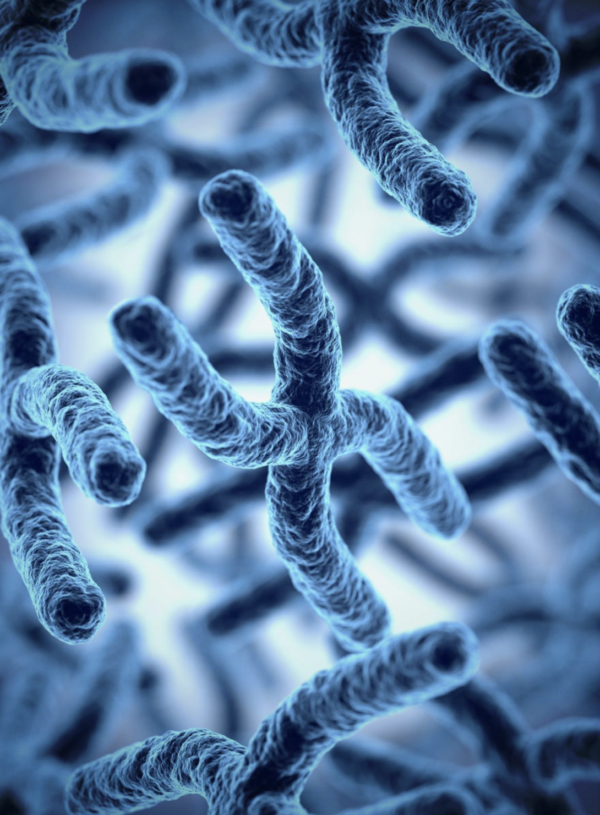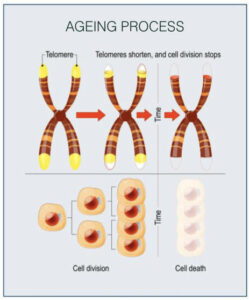
When we look at groups of people with psychiatric disorders related to dysregulated emotional responses, especially depression, and compare them to groups who have never experienced these disorders, they consistently have shorter telomeres.
Telomeres, as you may know, are the extra bits of DNA on the end of your chromosomes. They are like the plastic caps on the end of your shoelaces. When the caps on your shoelaces wear down, your shoelaces unravel. Well, telomeres work like that.
Your telomeres start shortening even before you are born. They keep shortening throughout your life. By the time you’re middle-aged, your telomeres are dramatically shorter. And this is not good news for your health. Every time your cells divide, your telomeres get a little shorter. Eventually, these telomere ‘caps’ get so short, that your cells can no longer make perfect copies of your DNA. So, cells go dormant or die. Many scientists think telomere shortening is one of the best markers of your true biological age. It means your cells are becoming less functional and less capable of repairing themselves. Shorter telomeres increase the chance that your cells become old and dormant. Almost like ‘zombie’ cells. Slowing down the shortening of your telomeres may be helpful in supporting healthy ageing at the cellular level. But being stressed all the time is a big problem for you and your telomeres. Constant stress leads to more cortisol – the stress hormone. And too much cortisol can weaken your cells through oxidative damage. An enzyme called telomerase can replenish it, but chronic stress and cortisol exposure decrease your supply. Scientists have discovered that too much cortisol also robs you of telomerase. This can speed up the shortening of your telomeres and accelerate ageing. Stress is now on
the map as one of the most consistent predictors of shorter telomere length. One study even found the damage inflicted by chronic stress was equal to 17 years of faster ageing! Evidence that psychological stress – both perceived stress and chronicity of stress – is significantly associated with higher oxidative stress, lower telomerase activity, and shorter telomere length, which are known determinants of cell senescence and longevity, in peripheral blood mononuclear cells from healthy premenopausal women.
Women with the highest levels of perceived stress have telomeres shorter on average by the equivalent of at least one decade of additional ageing compared to low-stress women. These findings have implications for understanding how, at the cellular level, stress may promote earlier onset of age-related diseases.
-Many scientists think telomere shortening is one of the best markers of your true biological age.

Stress also has the potential to weaken your immune system. A weakened immune system can lead to an imbalance of bacteria in your gut and skin known as dysbiosis. When this imbalance occurs on your skin, it can lead to redness or a rash. Common wisdom says stress can make your hair go grey. However, it’s only recently that scientists have figured out why. Cells called melanocytes produce a pigment called melanin that gives your hair its colour. A 2020 study published in Nature found that sympathetic nervous activity from stress can cause the stem cells that create melanocytes to disappear. Once these cells disappear, new cells lose their colour and turn grey. Chronic stress can also disrupt your hair’s growing cycle and lead to a condition called telogen effluvium. Telogen effluvium causes a larger than normal amount of hair to fall out. Stress is known to trigger or aggravate several conditions that may cause rashes or inflamed skin, such as psoriasis, eczema, and contact dermatitis. Stress causes changes to the proteins in your skin and reduces its elasticity. This loss of elasticity can contribute to wrinkling formation, with another old saying ‘frowning gives you wrinkles’, also having some truth to it as we age. Unfortunately, the body’s natural defences against stress gradually break down with age. But you don’t have to give in to stress just because you’re no longer young. There are several things we can do to stop prematurely ageing, from wearing sunscreen to using hydrating skincare. But internally is one area that is often forgotten when
combatting stress, and the proven relationship between our stress response and gut health. The brain has a direct effect on the stomach and intestines. For example, the very thought of eating can release the stomach’s juices before food gets there. This connection goes both ways. A troubled intestine can send signals to the brain, just as a troubled brain can send signals to the gut. Therefore, a person’s stomach or intestinal distress can be the cause of anxiety, stress, or depression. This is especially true in cases where a person experiences gastrointestinal upset with no obvious physical cause. For such functional GI disorders, it is difficult to try to heal a distressed gut without considering the role of stress and emotion. Therefore, looking at healing intestinal health and the stress response in otherwise healthy individuals, is a vital key to reducing the effects of premature ageing. Through allnatural ingredients, used for thousands of years in Chinese Herbal Medicine practices, Regul8’s Relax is one product used throughout the world as a stress relief supplement. Relax contains multiple skin benefits that look to support physical and mental functioning through maintaining a healthy digestive system.
REGUL8 RELAX

The below ingredients in Regul8’s Relax are contained in a micro-encapsulated formula to aid the stress response
internally:
Rhodiola – reduces cortisol, the stress hormone. It also stimulates your neurotransmitters like serotonin and dopamine, and it can improve your energy and mood.
Rehmannia glutinosa – has an anti-ageing effect due to the enhanced function of hematopoietic stem cells, HSCs. Mice fed with Rehmannia glutinsosa displayed characteristics of a slowed ageing process, including decreased senescence and increased rate of survival. This group also showed decreased reactive oxygen species levels and the percentage of β-gal+ cells through downregulation of the cellular senescence-associated protein.
Passionflower – contains many antioxidants, including vitamin C and lycopene, that neutralise the damaging free radicals that come from the ultraviolet rays and pollution. In other words, they protect skin cells and their DNA from the ageing effects of the sun.